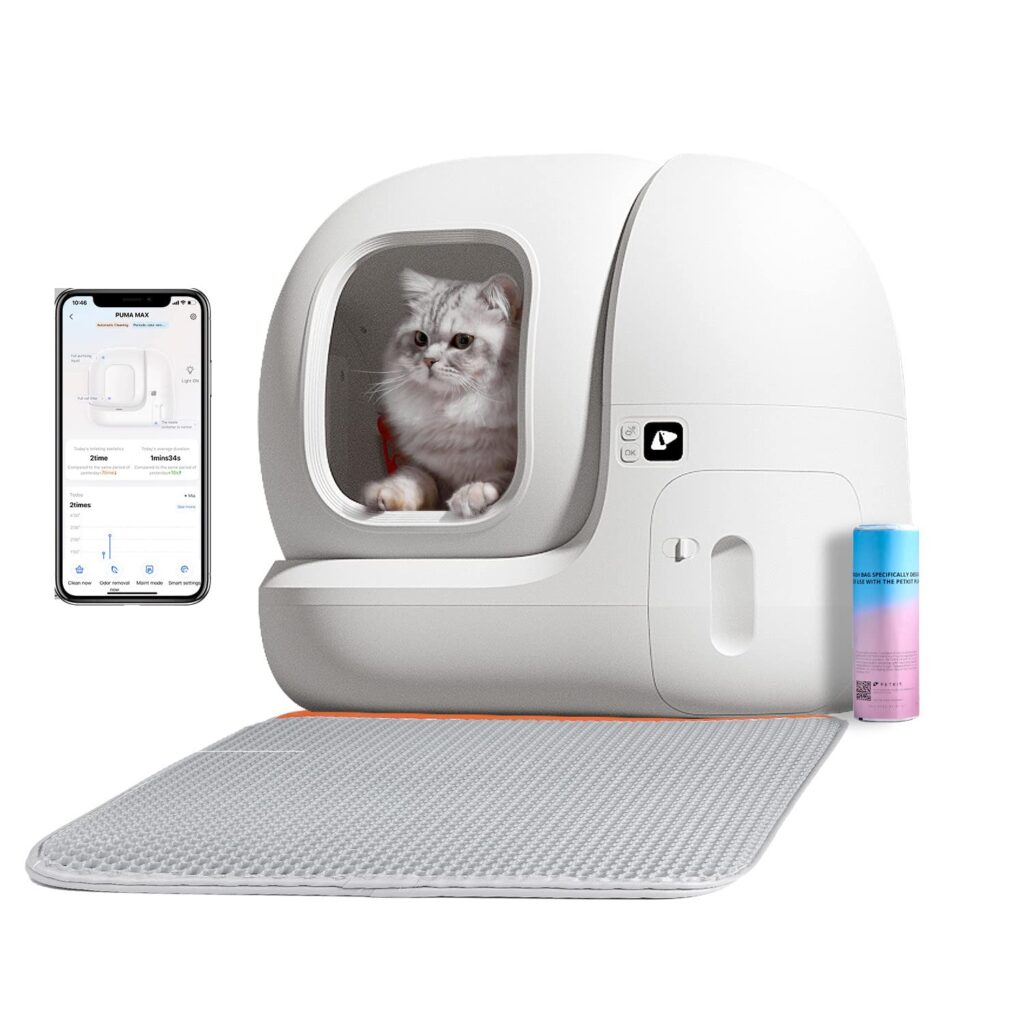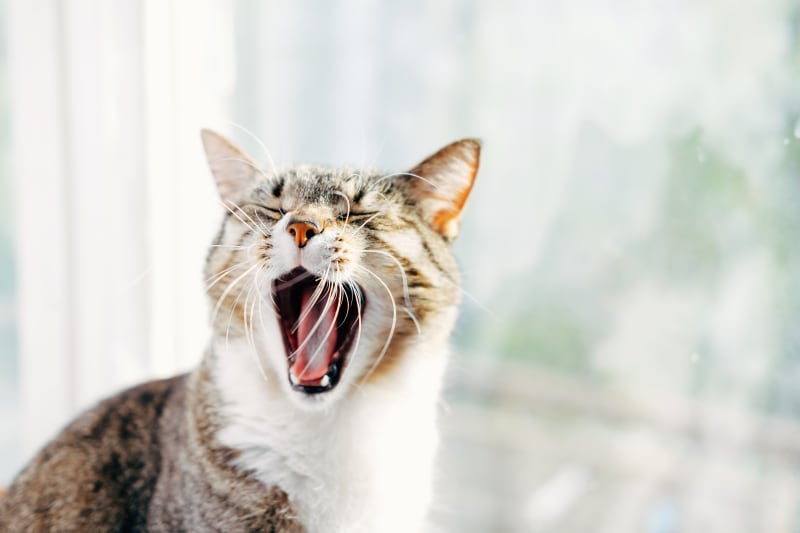Your kitten’s poop may smell bad due to various reasons, including an unbalanced diet, gastrointestinal infections, or parasites.
Contents
- 1 **1. Dietary Factors**
- 2 **2. Digestive System Issues**
- 3 **3. Medical Conditions**
- 4 **4. Stress And Anxiety**
- 5 **5. Dehydration**
- 6 **6. Intestinal Blockage**
- 7 **7. Antibiotic Use**
- 8 **8. Colitis**
- 9 **9. Coccidia**
- 10 **10. Giardia**
- 11 **11. Metabolic Disorders**
- 12 **12. Inflammatory Bowel Disease (ibd)**
- 13 **13. Anal Gland Problems**
- 14 **14. Excessive Gas**
- 15 **15. Fecal Impaction**
- 16 **16. Kitten’s Age**
- 17 Frequently Asked Questions On Why Does My Kitten’s Poop Smell So Bad? 16 Possible Causes
- 18 Conclusion
**1. Dietary Factors**
When it comes to kitten’s poop smell, dietary factors play a significant role. Poor quality or inappropriate food can lead to foul-smelling poop in kittens. If their diet lacks the necessary nutrients and is composed of low-quality ingredients, it can result in a stronger smell. Sudden dietary changes can also disturb their digestive system, causing an unpleasant odor in their poop. Overfeeding or excessive treats can overload their digestive system, leading to smelly feces.
:max_bytes(150000):strip_icc()/why-your-kitten-has-diarrhea-1341373489-2000-23f269d1f1944b7aa6c4944de804e845.jpg)
Credit: www.dailypaws.com
**2. Digestive System Issues**
One possible cause for your kitten’s bad-smelling poop could be digestive system issues. These issues can include intestinal parasites, bacterial or viral infections, or food intolerance or allergies. Intestinal parasites, such as roundworms or tapeworms, can disrupt the normal digestive process and result in foul-smelling stool. Similarly, bacterial or viral infections can affect the digestive system, leading to smelly poop. Food intolerance or allergies, especially to certain ingredients in their diet, can also result in unpleasant-smelling feces. If you notice bad-smelling poop in your kitten, it is important to consult with a veterinarian to determine the underlying cause and receive appropriate treatment.
**3. Medical Conditions**
Medical conditions can also contribute to bad-smelling poop in kittens. Gastrointestinal disorders can disrupt the normal digestion process and lead to foul-smelling stool. Pancreatic insufficiency occurs when the pancreas cannot produce enough enzymes to properly break down food, resulting in malabsorption and smelly feces.
Kidney or liver disease can also impact the smell of a kitten’s poop. The kidneys filter waste from the blood, and any dysfunction can affect fecal odor. Similarly, liver disease can alter the composition of bile, which plays a role in digestion and can impact the smell of stool.
**4. Stress And Anxiety**
4. Stress and Anxiety
Stress and anxiety can also contribute to your kitten’s foul-smelling poop. Environmental changes, such as moving to a new home or rearranging furniture, can cause stress in kittens. This stress can disrupt their digestive system and lead to smelly bowel movements.
Separation anxiety is another common stressor for kittens. When they are separated from their mother or siblings, they may experience anxiety and digestive issues. This can result in bad-smelling stool.
Other stressors, such as loud noises, unfamiliar people or animals, or changes in routine, can also affect your kitten’s digestive health. These stressors can disrupt their gut bacteria and cause smelly poop.
**5. Dehydration**
Dehydration is a possible cause of bad-smelling poop in kittens. When a kitten doesn’t consume enough water, it can lead to dehydration. This can happen due to various reasons, including lack of water intake or excessive exercise in hot weather, which can result in heatstroke. These factors contribute to the body losing water and becoming dehydrated, affecting the digestive system and resulting in smelly poop.
It is crucial to ensure that your kitten drinks enough water throughout the day. Provide fresh and clean water accessible to them at all times. Additionally, be mindful of their physical activity levels, especially during hot weather, to prevent heatstroke. It is advisable to keep them hydrated and provide a cool environment to minimize the risk of dehydration and its potential impact on their bowel movements.
**6. Intestinal Blockage**
Intestinal blockage in kittens can be a serious and potentially life-threatening condition. It occurs when a foreign object is ingested, leading to a narrowing of the intestine. This can cause a variety of symptoms, including abdominal pain, vomiting, and constipation. If left untreated, an intestinal blockage can lead to more serious complications, such as intestinal perforation or infection.
The ingestion of foreign objects is common in kittens due to their natural curiosity and tendency to explore their environment with their mouths. Small objects, such as toys, string, or hairbands, can easily be swallowed and become lodged in the intestines. Additionally, certain conditions, such as intestinal tumors or inflammation, can also lead to the narrowing of the intestines and ultimately result in a blockage.
**7. Antibiotic Use**
Antibiotics can be a potential cause for bad-smelling kitten poop due to their impact on gut bacteria. These medications are designed to kill harmful bacteria but they can also affect the beneficial ones present in the digestive system. This disruption of the gut bacteria balance can lead to changes in digestion and stool odor.
When antibiotics are administered to kittens, they may experience a shift in their gut microbiota composition, resulting in more odorous feces. This imbalance can persist even after completing the antibiotic treatment, as it takes time for the gut bacteria to restore their normal levels.
It’s important to note that antibiotics should only be used under the guidance of a veterinarian and for the prescribed duration. Overuse or misuse of antibiotics can further exacerbate gut bacteria disruption and contribute to persistent foul-smelling stool.
Preventive measures such as probiotic supplementation or incorporating a balanced diet can help maintain a healthier gut flora, potentially reducing the intensity of unpleasant stool odors.
Remember to consult your veterinarian for proper guidance and diagnosis if you suspect your kitten’s poop odor is extremely foul or persists despite dietary changes and proper hygiene.
**8. Colitis**
Colitis is another possible cause of bad-smelling poop in kittens. Colitis refers to the inflammation of the colon. When the colon becomes inflamed, it can result in loose stools that may have a strong odor. The inflammation can be caused by various factors, including infections, parasites, dietary issues, or even stress. To address colitis, it is important to identify and address the underlying cause. In some cases, a change in diet may be necessary to support digestive health and reduce inflammation. Additionally, medications or supplements may be prescribed to control the inflammation and promote healing. As always, consulting with a veterinarian is crucial to getting an accurate diagnosis and appropriate treatment for your kitten’s colitis.
**9. Coccidia**
One possible cause of why your kitten’s poop may smell bad is a protozoan infection called coccidia. Coccidia is a type of microscopic parasite that can infect the intestines of kittens. This infection can cause diarrhea, which may have a foul smell. It is important to note that coccidia is highly contagious and can spread from one kitten to another through fecal matter.
If you suspect that your kitten may have coccidia, it is recommended to consult with a veterinarian for proper diagnosis and treatment. The vet may prescribe medications to target the protozoan infection and alleviate the symptoms. Additionally, maintaining proper hygiene and regularly cleaning the litter box can help prevent the spread of coccidia and other infections.
Other possible causes of smelly kitten poop include dietary changes, gastrointestinal infections, parasites like worms, and even certain medical conditions. It is important to monitor your kitten’s poop and consult with a veterinarian if you notice any persistent changes in its smell or consistency.
**10. Giardia**
Infections can be a potential cause of bad-smelling kitten poop, and Giardia is one such parasitic infection. Giardia is a common intestinal parasite that affects cats and can cause diarrhea with a strong odor. This microscopic parasite can be ingested through contaminated food, water, or contact with infected animals. It settles in the intestines, leading to inflammation and discomfort for your kitten. The resulting loose stools are often accompanied by a foul smell.
Diagnosing Giardia typically involves examining a stool sample. Treatment usually involves medication prescribed by a veterinarian to eliminate the parasite. In addition to the prescribed medication, you can help prevent the spread of Giardia by practicing good hygiene and providing your kitten with clean and fresh food and water. Regularly disinfecting litter boxes and maintaining a clean living environment can also help prevent the transmission of this parasitic infection.
**11. Metabolic Disorders**
Metabolic disorders in kittens can contribute to the bad smell of their poop. There are 16 possible causes for this occurrence.
11. Metabolic DisordersDiabetes: One possible cause for your kitten’s smelly poop could be diabetes. When a kitten has diabetes, their body is unable to properly regulate glucose levels, leading to high blood sugar. This can cause gastrointestinal issues and result in foul-smelling stools. If you notice frequent urination, increased thirst, weight loss, or abnormal appetite in your kitten, it’s important to consult a veterinarian. Hyperthyroidism: Another metabolic disorder that can contribute to smelly poop is hyperthyroidism. This condition occurs when the thyroid gland produces an excess of thyroid hormones. Along with other symptoms like increased appetite, weight loss, and restlessness, hyperthyroidism can affect digestion and result in foul-smelling feces. If you suspect metabolic disorders like diabetes or hyperthyroidism in your kitten, seek veterinary attention for proper diagnosis and treatment.**12. Inflammatory Bowel Disease (ibd)**
One possible cause for your kitten’s smelly poop is Inflammatory Bowel Disease (IBD). IBD refers to chronic inflammation of the digestive tract, which includes the stomach, small intestine, and large intestine. This condition can lead to a variety of gastrointestinal symptoms, including smelly stools.
When the digestive tract is inflamed, it can affect the normal absorption and digestion of food, resulting in changes in stool odor. The inflammation can also cause an overgrowth of certain bacteria in the intestines, leading to an increase in foul-smelling compounds.
If your kitten has IBD, you may notice other symptoms such as diarrhea, vomiting, weight loss, and poor appetite. It is important to consult with a veterinarian for a proper diagnosis and treatment plan. Treatment options may include special diets, anti-inflammatory medications, and probiotics to restore a healthy gut flora.
**13. Anal Gland Problems**
In the case of your kitten’s smelly poop, anal gland problems may be the culprit. Impacted or infected anal glands can lead to foul-smelling excrement. These glands, located on either side of the rectum, produce a liquid secretion that is normally expelled when your kitten defecates. However, if the glands become impacted or infected, the secretions may build up and cause the poop to emit a strong odor.
**14. Excessive Gas**
Kitten poop can sometimes have a strong odor, which can be unpleasant in enclosed spaces or small apartments. One possible cause of this is excessive gas in the digestive system. When kittens eat, the food goes through a process called fermentation in their digestive system. This process breaks down the food and releases gases such as methane, hydrogen sulfide, and ammonia. These gases can contribute to the foul smell of their poop.
**15. Fecal Impaction**
One of the possible causes for a kitten’s poop smelling bad is fecal impaction, which refers to a build-up of hardened stool in the colon or rectum. Fecal impaction can occur due to various reasons such as inadequate fiber intake, dehydration, or certain medical conditions.
The hardened stool can accumulate over time, causing bloating, discomfort, and difficulty passing stools. This can lead to foul-smelling poop as the stool remains in the colon for longer periods.
If you suspect your kitten may have fecal impaction, it is essential to consult a veterinarian for proper diagnosis and treatment. The veterinarian may recommend stool softeners, dietary changes, or other interventions to help soften and remove the hardened stool.
Regular veterinary check-ups, proper hydration, and a balanced diet can help prevent fecal impaction and maintain a healthy digestive system in kittens.
**16. Kitten’s Age**
One of the possible causes for a kitten’s poop smelling bad is their age. Kittens have an immature digestive system, which can contribute to unpleasant odors in their feces. When kittens are born, their digestive system is not fully developed, and it takes time for it to mature. During this period, their bodies may not be able to completely break down and digest food, leading to stronger-smelling poop.
Frequently Asked Questions On Why Does My Kitten’s Poop Smell So Bad? 16 Possible Causes
What Does It Mean When Kitten Poop Smells Really Bad?
Kitten poop smelling really bad may indicate an underlying health issue, like a gastrointestinal problem or dietary imbalance. It’s important to monitor their behavior and consult a veterinarian if the smell persists or if your kitten shows signs of discomfort or illness.
How Do I Stop My Kitten’s Poop From Smelling?
To reduce your kitten’s poop odor: 1. Clean the litter box daily to prevent buildup. 2. Use high-quality, odor-controlling litter. 3. Feed your kitten a balanced, high-quality diet. 4. Add a litter box deodorizer or baking soda to absorb odors.
5. Consider consulting a veterinarian if the problem persists.
Why Does My Cat’s Poop Always Stink?
Cat poop stinks because of the breakdown of proteins and the presence of harmful bacteria.
What Does Poop Smell Like With Liver Disease?
In liver disease, poop may have a distinct smell, often described as sweet or musty. This odor is caused by changes in the digestive process due to liver dysfunction.
Conclusion
To sum it up, understanding why your kitten’s poop smells bad is important for their overall health and well-being. By examining potential causes such as diet, parasites, or underlying medical conditions, you can take appropriate steps to address the issue.
Remember to consult with your veterinarian to accurately diagnose and treat any problems your feline friend may be experiencing. With proper care and attention, you can ensure your kitten stays happy and healthy.

Katie Lindsey is a passionate cat lover and founder of Cats Solution, a comprehensive resource for all things feline. With a lifelong love for cats and extensive knowledge in their care and behavior, she provides expert advice and solutions to cat owners. Through her website, Katie fosters a supportive community where cat enthusiasts can find guidance and heartwarming stories. A dedicated advocate for animal welfare, Katie also promotes responsible pet ownership and adoption. Join her on this purr-fect journey celebrating the joy of feline companionship.



